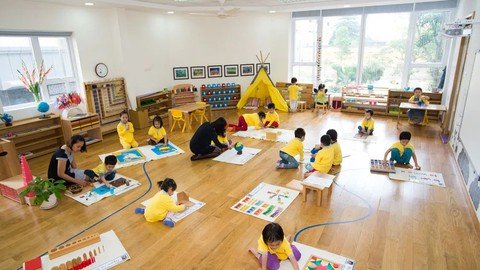
Published 6/2022
MP4 | Video: h264, 1280x720 | Audio: AAC, 44.1 KHz
Language: English | Size: 838.76 MB | Duration: 0h 52m
The Power of the Montessori in Raising Children I Referral CPD platforms
What you'll learn
1. Know the brief history of Montessori
2. Understand the definition of Montessori and the difference between traditional education and Montessori
3. 10 Basic Principles of Montessori
a. Prepared Environment
b. Natural Learning Desire
c. Concrete Learning
d. Observation
e. Independence
f. Responsibility
g. Respect
h. Critical Periods
4. Montessori mobiles
a. Munari Mobile
b. Octahedron Mobile
c. Gobbi Mobile
d. Dancers Mobile
5. Montessori Activities
a. Language Skills
b. Hand-eye Coordination
c. Music and Movement
d. Daily Life Skills
e. Art Skills
6. Designing Montessori Homes
a. Hallway
b. Livingroom
c. Kitchen
d. Bedroom
e. Bathroom
f. Reading Area
g. Outdoor/Backyard
7. Setting Rules in the Montessori Approach
8. Teaching Children about Emotions
9. Praise and Labelling
10. Daily Routines in Montessori
a. Sleep
b. Mealtime
c. Brushing Teeth
d. Toilet Training
Requirements
No
Description
Dr. Maria Montessori was one of the first female doctors in Italy in the late 1800s. she took care of the poor and children in the clinic where she worked. In one specific case she studied, she noticed that children were picking breadcrumbs because they suffered from sensory deprivation. To solve the problem Dr. Montessori began to educate children. She understood that medical education and medicines were inadequate for these children. Therefore, she gave her full attention to the philosophy of education, psychology, and anthropology. Later she was invited by the Italian state to open a nursing home in Rome for children whose parents were working. Finally, in 1907 she opened Case Dei Bambini (Children's House) to provide education to low-income children in Rome. It didn't take long time for her work to attract attention and be heard internationally. Montessori method of education had spread to United States in early 1900s and became very popular. Dr. Maria Montessori continued her studies in the field of education until her death in 1952. On the contrary to traditional education, Dr. Maria Montessori believes children needs freedom to develop their physical, intellectual, and spiritual parts. A freedom to be achieved through order and self-discipline is the must in Montessori philosophy. Contrary to popular belief, there are many rules in the Montessori philosophy that will benefit the child. For example, the child cannot take the presented activity outside the playground or eat standing up.Compared to traditional education, Montessori is the only approach that fits every child because in the traditional method every single child should learn at the same time. However, Montessori method allows children to learn at their own pace. Montessori materials are placed on the shelves in order from easiest to most difficult. so that each child works at their own pace with material that is relevant to their immediate interests. Meanwhile, the teacher is in the position of an observer. if the teacher thinks the child has mastered the material, he or she will incorporate the subsequent material into the training.While in traditional education only the adult affects the child, in Montessori education the child, the adult and the environment are in a dynamic relationship. The environment is arranged in such a way that the child can be interested, and the child learns in this way. The adult who regulates the environment observes the child and repeats the necessary adjustments.Dr. Maria Montessori argues that the purpose of the Montessori education is not to fill the child with real information, but rather to support his natural desire to learn.Montessori education and philosophy is not only to be applied in schools, but also in our homes we give our children specificities and set limits so that they can make discoveries.
Overview
Section 1: Giriş
Lecture 1 Intro
Lecture 2 Basic Principles
Lecture 3 Montessori Mobiles
Lecture 4 Montessori Activities
Lecture 5 Designing Montessori Home
Lecture 6 Setting rules in the Montessori approach
Lecture 7 Teaching Children About Emotions
• Childhood Specialists,• Parents,• Preschool Teachers,• Early Childhood School Program Developers
Homepage
https://www.udemy.com/course/powerofmontessori/
https://rapidgator.net/file/e0cb0284e56dd107144119c11b17cc2f/dkqse.The.Power.Of.The.Montessori.In.Raising.Children.rar.html

https://nitro.download/view/5FE6811BF7E7E45/dkqse.The.Power.Of.The.Montessori.In.Raising.Children.rar

https://uploadgig.com/file/download/3DA5e65c725c8af3/dkqse.The.Power.Of.The.Montessori.In.Raising.Children.rar
Links are Interchangeable - No Password - Single Extraction
